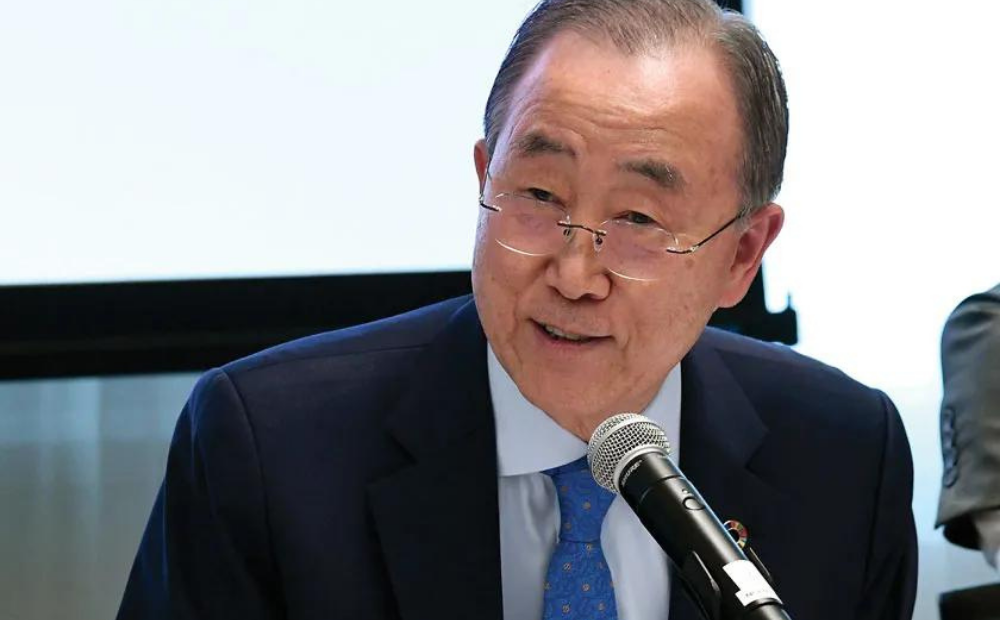PHOTO BY EUGENE GOLOGURSKY/GETTY IMAGES FOR INTERNATIONAL RESCUE COMMITTEE)
Ban Ki-moon, former United Nations Secretary-General, deputy chair of the Elders, speaks at a Business Refugee Action Network event on Sept.24, 2019 in New York City. At the event, more than a dozen CEOs signed up to support refugees.
FOLLOWING PUBLICATION of his memoir, Resolved: Uniting Nations in a Divided World, Former U.N. Secretary-General Ban Ki-moon has written a bombshell of an opinion piece for the Financial Times about the Palestinian-Israeli conflict. Ban has been in bad company, which might explain it. He is now one of “The Elders,” the group of senior states-people that was founded by Nelson Mandela among others and includes former Irish President and U.N. Human Rights Commissioner Mary Robinson. The Elders have consistently considered U.N. resolutions and international law as more important on the Middle East than the whims of AIPAC as transmitted by the U.S.
It is a comment on the U.S. and Anglosphere that a U.N. Secretary-General uttering truths that are manifestly self-evident should seem a bombshell, but the quiet unassuming Ban puts all of them, Boris Johnson, Justin Trudeau and Joe Biden to shame. He would have put President Donald Trump to shame as well except the man clearly has none.
“It is clear that the 1993 Oslo Accords no longer offer a viable pathway toward self-determination for the Palestinians and have failed to deliver peace and security in Israel or Palestine. Instead, Israel has pursued a policy of incremental de facto annexation in the territories it has occupied since 1967, to the point where the prospect of a two-state solution has all but vanished,” he wrote for the newspaper, adding: “The starting point of a new approach must be to recognize the fundamental asymmetry between the parties. This is not a conflict between equals that can be resolved through bilateral negotiations, confidence-building measures or mutual sequencing of steps—the traditional conflict-resolution tools. The reality is very different: a powerful state is controlling another people through an open-ended occupation, settling its own people on the land in violation of international law and enforcing a legal regime of institutionalized discrimination.”
In effect, he recognized what this column in the Washington Report has been pointing out for decades. Calls for “non-interference” and for the bilateral negotiations between Israel, ultimately backed as it is by the U.S., and the Palestinians, now shorn of almost all allies by U.S. and Israeli diplomacy, are tantamount to thrusting a toddler in the dojo with a champion Sumo wrestler and calling for a fair fight.
“It is now time for the international community to recognize and confront the consequences of Israel’s policies and actions in this regard. The lack of any international legal accountability has enabled Israel to ignore successive U.N. resolutions, most recently UNSCR 2334 of December 2016, which says that settlement building violates international law. That is why the International Criminal Court’s rulings that it has jurisdiction over the Palestinian territories and plans to investigate war crimes committed by all sides are so important and give grounds for modest hope.” It is a bold, if somewhat belated statement of the truth. And we can perhaps judge its importance by the deafening sound of silence from the usual suspects, who perhaps judge that attacking such an eminently lucid statement would bring publicity to it.
When he first took office, Ban had been foreign minister of South Korea where he could barely see the Eastern Mediterranean past Russia, China, North Korea, Japan and the USA. But the Israelis shrewdly assessed his likely humanitarian reaction to their treatment of Gazans and did their best to keep him out. But he insisted and was horrified.
Consistent with his policy of not fighting in public, he bore insults from Netanyahu, the Moroccan king and other overweening pretenders draped in the borrowed strength of the United States. A master of litotes, as he said of one consultation with Netanyahu about a visit to Iran, “He was never an amicable person, but it was unacceptable for him to speak so rudely to a secretary-general. Our conversation left me feeling bitter.” And that is the mark of the man—a self-effacing diplomat. Peacemakers and diplomats seem to have felt more indignation about Netanyahu’s abuse than the U.S. politicians, from the Clintons onwards, who got the same arrogant treatment. His attempts to bring Iran into the fold were thwarted by other influences not least Iran and Israel themselves. He sums it up neatly, “Hamas listened only to Tehran and Damascus, and Israel listened to no one!”
The self-effacement that he practiced as a diplomatic tool almost certainly went too far to uphold his international reputation. He reproached Bashar al-Assad and Netanyahu face to face, but if the U.N. is to redeem the Charter, these people need to be named and shamed publicly. The sad paradox is that the more the U.N. and its leadership fail to do so, the less stature it has to be effective.
To be fair, to use George W. Bush’s neologism, Ban was often “misunderestimated” and was brave, principled and effective in areas like women’s position at the U.N., gay rights there and internationally, and above all climate change.
However, occasionally his lack of familiarity with some issues in the face of determined obfuscation shows through in his new book, like when he says that Algeria and Mauritius withdrew their claims to Western Sahara in in 1979. In the inner dynamics of the U.N., I would suspect that the people around Ban had been browbeaten by Franc-Moroccan supporters.
In fact, Algeria never made any claims of its own, supporting Polisario’s bid for independence, and it was neighboring Mauretania, not Mauritius, far away in the Indian Ocean, that gave up its claim in the face of Polisario resistance.
While the Palestinians have been abandoned by many of their allies in the face of relentless U.S./Israeli lobbying they benefit from generations of truth telling by objective U.N. members. Sadly, the Sahrawis have Morocco and France lined up against them with the tacit support of the U.S. under most administrations.
One of the tests for the Biden administration is how soon it will back Trump’s illegal “recognition” of the Moroccan claim to Western Sahara, not least since it was part of the previous administration’s cooked-up deals to get third party acceptance of Israeli occupation.
The other test is, of course, what Ban said. “Lack of any international legal accountability has enabled Israel to ignore successive U.N. resolutions, most recently UNSCR 2334 of December 2016, which says that settlement building violates international law.” The U.S. and Biden need to restore accountability.














